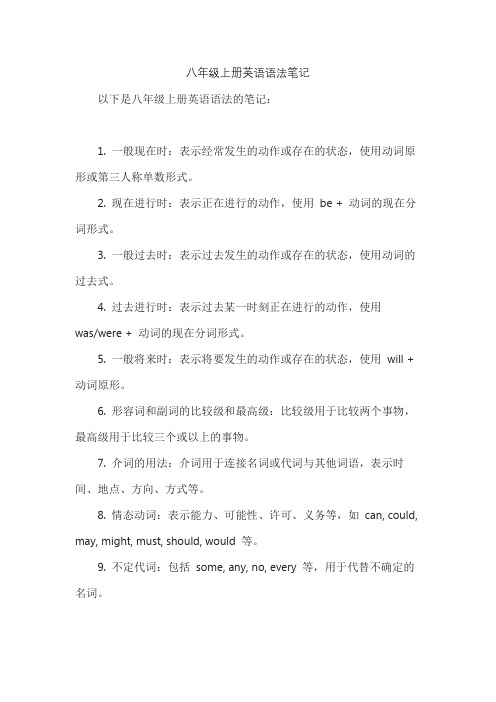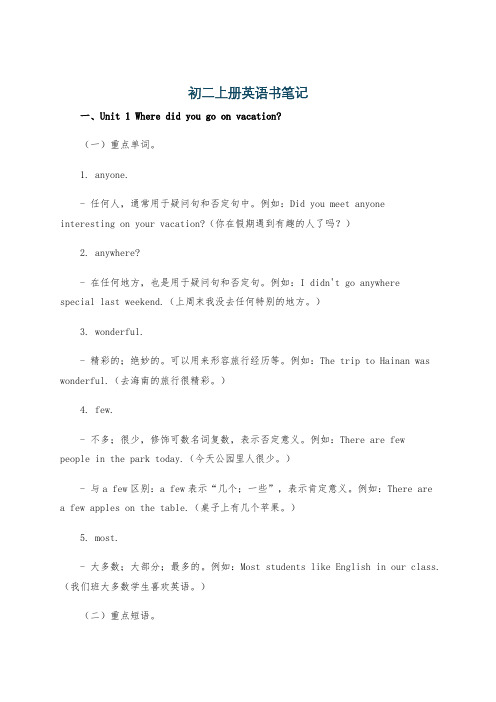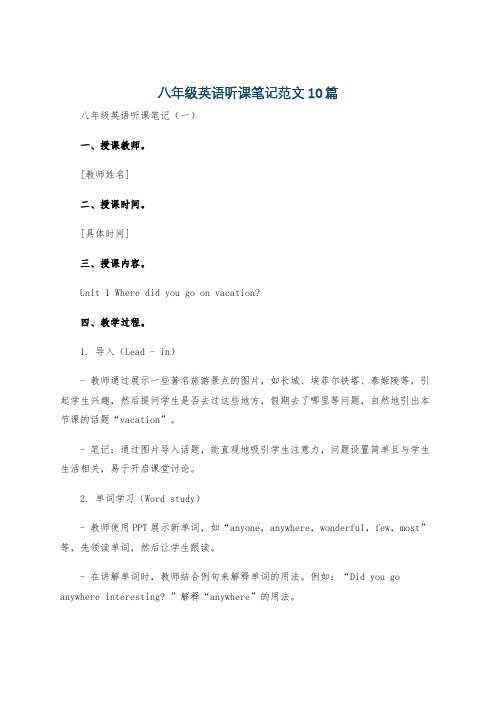初二英语笔记
英语8年级笔记

英语8年级笔记
以下是八年级英语的一些重要知识点和笔记:
1. 语法重点:过去进行时态(Past Continuous Tense)。
这个时态主要用来描述在过去某个时间点正在发生的动作。
基本结构是“was/were + 动词ing”。
2. 词汇重点:掌握一些常用的动词短语,如“turn on/off”、“take off”、“put on”等,以及一些常用的形容词短语,如“asleep”、“awake”等。
3. 语言点:学习如何使用副词来描述动作的方式,如“slowly”、“quickly”等。
同时,还要学习如何使用连词来连接两个句子,如“and”、“but”、“or”等。
4. 写作练习:练习写简单的段落,包括主题句、支持句和结论句。
同时,学习如何使用过渡词来使文章更加流畅。
5. 听力和口语练习:通过听英语歌曲、看电影等方式来提高听力和口语能力,同时学习一些常用的口语表达方式。
6. 阅读理解:通过阅读英文文章来提高阅读理解能力,同时学习一些阅读技巧,如预测文章内容、寻找主题句等。
7. 文化知识:了解一些英语国家的文化背景和习俗,如节日、饮食、礼仪等,有助于更好地理解和运用英语。
以上是八年级英语的一些重点知识点和笔记,希望能对你有所帮助。
八年级上册英语语法笔记

八年级上册英语语法笔记
以下是八年级上册英语语法的笔记:
1. 一般现在时:表示经常发生的动作或存在的状态,使用动词原形或第三人称单数形式。
2. 现在进行时:表示正在进行的动作,使用be + 动词的现在分词形式。
3. 一般过去时:表示过去发生的动作或存在的状态,使用动词的过去式。
4. 过去进行时:表示过去某一时刻正在进行的动作,使用
was/were + 动词的现在分词形式。
5. 一般将来时:表示将要发生的动作或存在的状态,使用will + 动词原形。
6. 形容词和副词的比较级和最高级:比较级用于比较两个事物,最高级用于比较三个或以上的事物。
7. 介词的用法:介词用于连接名词或代词与其他词语,表示时间、地点、方向、方式等。
8. 情态动词:表示能力、可能性、许可、义务等,如can, could, may, might, must, should, would 等。
9. 不定代词:包括some, any, no, every 等,用于代替不确定的名词。
10. 反身代词:用于指代动作的执行者,如myself, yourself, himself, herself, itself, ourselves, yourselves, themselves。
初二上册英语书笔记

初二上册英语书笔记一、Unit 1 Where did you go on vacation?(一)重点单词。
1. anyone.- 任何人,通常用于疑问句和否定句中。
例如:Did you meet anyone interesting on your vacation?(你在假期遇到有趣的人了吗?)2. anywhere?- 在任何地方,也是用于疑问句和否定句。
例如:I didn't go anywherespecial last weekend.(上周末我没去任何特别的地方。
)3. wonderful.- 精彩的;绝妙的。
可以用来形容旅行经历等。
例如:The trip to Hainan was wonderful.(去海南的旅行很精彩。
)4. few.- 不多;很少,修饰可数名词复数,表示否定意义。
例如:There are few people in the park today.(今天公园里人很少。
)- 与a few区别:a few表示“几个;一些”,表示肯定意义。
例如:There are a few apples on the table.(桌子上有几个苹果。
)5. most.- 大多数;大部分;最多的。
例如:Most students like English in our class.(我们班大多数学生喜欢英语。
)(二)重点短语。
1. go on vacation.- 去度假。
例如:They went on vacation in Paris last year.(他们去年去巴黎度假了。
)2. stay at home.- 待在家里。
例如:I stayed at home and watched TV yesterday.(我昨天待在家里看电视了。
)3. go to the mountains.- 去爬山。
例如:We went to the mountains and had a great time.(我们去爬山了,玩得很开心。
八年级英语重点笔记人教版

八年级英语重点笔记人教版Unit 1:Where did you go on vacation?重点单词:vacation, delicious, crowded,决定,尝试,拥挤的,美丽的,放松的重点句子:1、I went to the beach and saw some interesting animals.2、I feel more relaxed after a vacation.3、We visited some interesting places during the vacation.Unit 2:How often do you exercise?重点单词:how often, once a week, twice a day, hardly ever, result, online, question, effort 重点句子:4、How often do you watch TV?5、I usually exercise three times a week.6、Watching TV for too long can be harmful to your health.Unit 3:I'm more outgoing than my sister.重点单词:outgoing, quiet, carefully, carelessly, carefully, wildly, loudly, bravely重点句子:7、I'm more outgoing than my friend.8、She is more careful than me in her work.9、He sings more loudly than anyone else in his class.Unit 4:What's the best movie theater?重点单词:comfortable, cheap, crowded, bad, close to home, screen, sound, equipment 重点句子:10、What is the best movie theater in the city?11、The movie theater that has the biggest screen is the best.12、The movie theater that has the most comfortable seats is the best.Unit 5:Do you want to watch a game show?重点单词:boring, discussion, educational, plan, stand, expect, mind, hope重点句子:13、I don't mind watching a game show.14、I expect to watch a news program.15、I hope to see a talk show.Unit 6:I'm going to study computer science.重点单词:pilot, engineer, teacher, doctor, cook, lawyer, secretary, pilot重点句子:16、What do you want to be when you grow up?17、I'm going to be a doctor.18、I want to be a teacher because I like working with children.Unit 7:Will people have robots?重点单词:possible, impossible, human, future, environment, pollution, space, other 重点句子:19、It is possible that we will live to be 100 years old in the future.20、It is impossible for us to travel to the moon in the future.21、We need to protect the environment and reduce pollution.Unit 8:How do you make a banana milk shake?重点单词:ingredient,peel,pour,yogurt,honey,enjoy,cut,blender 重点句子:22、How many bananas do we need for the banana milk shake?23、First peel the bananas and cut them into pieces.24、Then pour the milk into the blender and add the bananas and yogurt.25、Finally add honey and blend the mixture until it is smooth.26、Enjoy your banana milk shake!。
八年级英语听课笔记范文10篇

八年级英语听课笔记范文10篇八年级英语听课笔记(一)一、授课教师。
[教师姓名]二、授课时间。
[具体时间]三、授课内容。
Unit 1 Where did you go on vacation?四、教学过程。
1. 导入(Lead - in)- 教师通过展示一些著名旅游景点的图片,如长城、埃菲尔铁塔、泰姬陵等,引起学生兴趣,然后提问学生是否去过这些地方,假期去了哪里等问题,自然地引出本节课的话题“vacation”。
- 笔记:通过图片导入话题,能直观地吸引学生注意力,问题设置简单且与学生生活相关,易于开启课堂讨论。
2. 单词学习(Word study)- 教师使用PPT展示新单词,如“anyone,anywhere,wonderful,few,most”等,先领读单词,然后让学生跟读。
- 在讲解单词时,教师结合例句来解释单词的用法。
例如:“Did you go anywhere interesting? ”解释“anywhere”的用法。
- 笔记:单词教学采用先领读再讲解例句的方式,有助于学生掌握单词的读音和用法。
结合例句记忆单词效果更好。
3. 语法讲解(Grammar)- 重点讲解一般过去时的特殊疑问句。
教师在黑板上写出例句:“Where did you go on vacation?”“What did you do?”等。
- 分析句子结构,强调助动词“did”的用法,以及动词在一般过去时中的变化形式。
- 笔记:语法讲解清晰,在黑板上写例句方便学生观察句子结构,有助于理解一般过去时特殊疑问句的构成。
4. 听力练习(Listening practice)- 播放听力材料,听力内容是关于不同人假期的经历。
- 在播放听力之前,教师给出一些听力问题,如“Where did Tom go?”“What did he do there?”等,让学生带着问题听听力。
- 听力结束后,教师与学生一起核对答案,并对听力中的重点内容进行再次强调。
八年级上册外研版英语书笔记

八年级上册外研版英语书笔记外研版八年级上册英语书笔记。
一、Module 1 How to learn English。
(一)重点单词。
1. pair.- n. (相关的)两个人,一对,一双。
例如:a pair of shoes(一双鞋);a pair of glasses(一副眼镜)。
- 常见搭配:in pairs(成对地,成双地)。
2. correct.- v. 改正;纠正。
例如:Please correct your mistakes.(请改正你的错误。
)- adj. 正确的,对的。
其反义词为“incorrect”。
例如:The answer is correct.(答案是正确的)。
3. spelling.- n. 拼写。
例如:Your spelling should be improved.(你的拼写应该被提高。
)4. word.- n. 单词;词;话语。
例如:Learn these words by heart.(用心学习这些单词。
);He didn't say a word.(他一句话也没说。
)5. practice.- n. 练习。
是不可数名词。
例如:We need more practice.(我们需要更多的练习。
)- v. 练习,后接名词、代词或动名词。
例如:practice speaking English(练习说英语)。
(二)重点短语。
1. look up.- 查;查找。
例如:Look up the new words in the dictionary.(在字典里查找新单词。
)2. make a mistake/make mistakes.- 犯错误。
例如:Don't be afraid of making mistakes.(不要害怕犯错误。
)3. write down.- 写下;记下。
例如:Write down your name and address.(写下你的名字和地址。
八年级英语听课笔记范文10篇

八年级英语听课笔记范文10篇听课笔记一:Unit 1 Where did you go on vacation?一、教学目标。
1. 语言知识目标。
- 学生能够掌握重点单词,如:anyone, anywhere, wonderful, few等。
- 熟练运用重点句型“Where did you go on vacation? I went to...”进行对话交流。
2. 语言技能目标。
- 通过听力训练,提高学生获取信息的能力。
- 让学生能够用英语描述自己的假期经历。
二、教学过程。
1. 导入(Lead - in)- 教师展示一些著名旅游景点的图片,如长城、埃菲尔铁塔等,然后问学生是否去过这些地方,引出本节课话题“vacation”。
这个导入方式很直观,能迅速吸引学生的注意力,激发他们的学习兴趣。
2. 新单词学习(New words learning)- 教师使用多媒体展示单词图片和例句,领读单词。
在讲解“anyone”和“anywhere”时,特别强调了“any -”的用法,以及与“someone”和“somewhere”的区别。
这种对比教学有助于学生更好地理解和记忆。
3. 听力训练(Listening practice)- 播放听力材料之前,教师先让学生快速浏览听力题目,预测听力内容。
这是一个很好的听力技巧训练。
听力播放过程中,教师提醒学生注意关键词。
听完后,让学生回答问题并进行小组讨论核对答案。
4. 对话练习(Pair work)- 教师给出对话模板,让学生两人一组练习对话,询问对方的假期去处。
在学生练习过程中,教师巡视并给予指导,及时纠正学生的语法和发音错误。
5. 课堂总结(Summary)- 教师引导学生回顾本节课所学的单词和句型,强调重点和难点。
三、教学方法。
1. 直观教学法:通过图片展示新单词,让学生更易理解。
2. 任务驱动法:以听力任务、对话任务等驱动学生学习。
四、教学评价。
1. 教师对学生的表现给予及时的评价,以正面评价为主,如“Good job”“Well - done”等,增强了学生的自信心。
八年级上册英语笔记1~10单元

八年级上册英语笔记(1 - 10 单元)一、Unit 1 Where did you go on vacation?(一)重点词汇1.anyone /ˈeniwʌn/ 任何人-解析:用于疑问句和否定句中,表示“任何人”。
-例句:Did anyone see my keys?(有人看到我的钥匙了吗?)2.wonderful /ˈwʌndəfl/ 精彩的;极好的-解析:形容事物非常好,令人愉悦。
-例句:We had a wonderful time on vacation.(我们在假期里过得非常愉快。
)3.few /fjuː/ 很少;几乎没有-解析:修饰可数名词,表示数量少。
-例句:There are few people in the park today.(今天公园里人很少。
)4.quite a few 相当多;不少-解析:强调数量比较多。
-例句:I took quite a few photos on my trip.(我在旅行中拍了不少照片。
)5.most /məʊst/ 大多数;大部分-解析:可作形容词、名词或副词。
-例句:Most people like to travel.(大多数人喜欢旅行。
)(二)重点句型1.Where did you go on vacation? 你去哪里度假了?-解析:这是一个特殊疑问句,询问过去的动作。
-例句:Where did you go last weekend?(你上周末去哪里了?)2.Did you go anywhere interesting? 你去了什么有趣的地方吗?-解析:一般疑问句,用“Did + 主语+ 动词原形”的结构。
-例句:Did you do anything special yesterday?(你昨天做了什么特别的事情吗?)3.I went to the mountains. 我去了山区。
-解析:简单的陈述句,表达过去的动作。
- 1、下载文档前请自行甄别文档内容的完整性,平台不提供额外的编辑、内容补充、找答案等附加服务。
- 2、"仅部分预览"的文档,不可在线预览部分如存在完整性等问题,可反馈申请退款(可完整预览的文档不适用该条件!)。
- 3、如文档侵犯您的权益,请联系客服反馈,我们会尽快为您处理(人工客服工作时间:9:00-18:30)。
英语笔记冠词(Article)英语中的冠词有两类,一类是不定冠词,另一类是定冠词。
不定冠词有a和an两个。
the是定冠词,在辅音前读/ /,在元音前读/ /。
1.不定冠词 (Indefinite Article) a/an 的用法如:A computer works more accurately than a human brain. (表示类指)A horse is a useful animal.A tall boy is waiting for me at the school gate. (表示泛指)There is a European map on the wall. (表示数量)In 1972, two fishermen said that they had seen a UFO in the sky注:a用在以辅音(音标)开头的单词前,an用在以元音(音标)开头的单词前。
试比较:.a university /uniform an uncle /umbrellaa usual day an unlucky numbera one-eye dog an houra one-hundred-dollar bill an honest boya/an 用在一些习惯用语中如:have a good time , have a break, have a look, in a hurry , for a while, a pair of , with a smile,take an active part in , catch a bus, take a walk 等2.定冠词(Definite Article) the 的用法如:The lady in black is our English teacher. (表示特指)The water in the Suzhou Creek (苏州河) has become very clean now.I have a cat and a dog. The cat is white and the dog is brown. (第二次提到)The Nile is the longest river in the world. (形容词的最高级前)Our classroom is on the second floor. (序数词前)The sun is far bigger than the earth. (宇宙中独一无二的事物前)The Yangtze River is one of the longest rivers in the world. (江河、海洋、山脉前)Pudong is in the east of Shanghai. (方位前)I practise the piano every day. (乐器前)Have you ever been to the United States? (由两个或两个以上的普通名词组成的专有名词前)We should help the poor. (在形容词前表示一类人)注:(1)在名次和带有序数词的街道名称前一般不用定冠词the,如:My aunt lives on Fifth Avenue. She doesn’t live on 23rd Street.Who won first place in the speech contest?(2) 除earth以外的行星前一般不加定冠词the,如:Jupiter(木星)is the biggest planet in the solar system.This book is about a trip to Mars(火星).the 用在一些习惯用语中如:in the morning, the day after tomorrow, listen to the radio, at the moment, during the day,go to the beach/ cinema/ concert, by the way , in the end , in the middle of 等。
3. 一般不用冠词的情况( Zero Article)如:We study maths, Chinese, English and so on.(学科名称前)December 25th is Christmas Day. (日期、节日前)I was born in July. ( 月份、星期、季节等)What do you have for breakfast? (三餐前)We play football after school every day. (球类运动前)What can I do for you, madam? (称呼、头衔、职务前)I like reading books. (可数名词复数前,表示类指)Snow is white.(不可数名词前,表示类指)We are going to have a picnic this coming Saturday.(在this, those, next last every, each, my, whose, some any 等词前)Shanghai is famous for Yu Garden.(由一个专有名词和一个普通名词组成的专有名词前)不用冠词的固定词组如: by train/ motorcycle, at night, at first, after class, at home, in trouble,go to school / church, be in hospital 等结束性动词——延续性动词1. “离开” The train left 10 minutes ago.The train has been away for 10 minutes.2. “开始” The film began 5 minutes ago.The film has been on for 5 minutes.3. “买” I bought the computer 2 years ago.I have had the computer for 2 years.4. “借” Mary borrowed th e book 2 days ago.Mary has kept the book for 2 days.5 “参加” My brother joined the army 3 years ago.My brother has been in the army for 3 years.My brother has been a soldier for 3 years.6 “死” His grandpa died a week ago.His grandpa has been dead for a week.1. “来去” Mr. Hans came to China in 1985.Mr. Hans has been in China since 1985.区别:(1) have/ has been to sp. ( 某人) 曾去过某地(2) have/ has gone to sp. (某人)已去某地了(某人不在说话地)(1) A: Have you ever been to Beijing?B: Yes. I have.A: When did you go there?B: I went there last summer.(2) A: Where is Mr. Li ?B: He has gone to Nanjing. He has been there for 2 days.A: When will he come back?B: In 3 days.How 短语for 10 minutes – how long 多久(一段时间)in a week – how soon 多久以后(一点时间)twice a year -- how often 多久一次(表示频率)3 miles – how far 多远(表示路程)3 miles in ten minutes – how fast 多快(表示速度)Speak, say, tell, talk 的区别:1. speak 及物动词“说,讲”后通常用语言。
*speak English/ French/ several languages, etc.*speak to sb. 和某人说话(常用于打电话)*speak at the meeting 在会上发言*make a speech 作演讲2. say 及物动词“说”,强调说的内容。
如,He said nothing to me about it. 这件事他完全没对我说。
Please say it/ this in English. 请用英语说。
Every night, Sam says, “Good night! Mum”Our teacher said that she had ever been to the USA.What he said sounds interesting.It’s said that we’re going an outing next Friday.Ex.(1) Did our monitor _______ at the meeting yesterday?(2) What did our monitor _______ at the meeting yesterday?3. tell 及物动词“告诉”*tell sb. sth.= tell sth. to sb.如,They’ve told us that they’re not coming this evening. He told the news to everyone in the village.*tell sb. stories / jokes 给某人讲故事笑话*tell a lie/ lies 说谎*tell the truth 说实话*tell the time 辨认时间*tell A from B 区分A和B= tell the difference between A and B*tell sb. (not) to do sth 告诉某人(不要)做某事如,Our teacher often tells us not to talk in class.4. talk 不及物动词“谈论,讨论”*talk to/ with sb. 和某人谈话= have a talk with sb.*talk about sth. 谈论某事如,What are they talking about?*talk sth. over with sb. 和某人讨论某事= discuss sth. with sb.。
